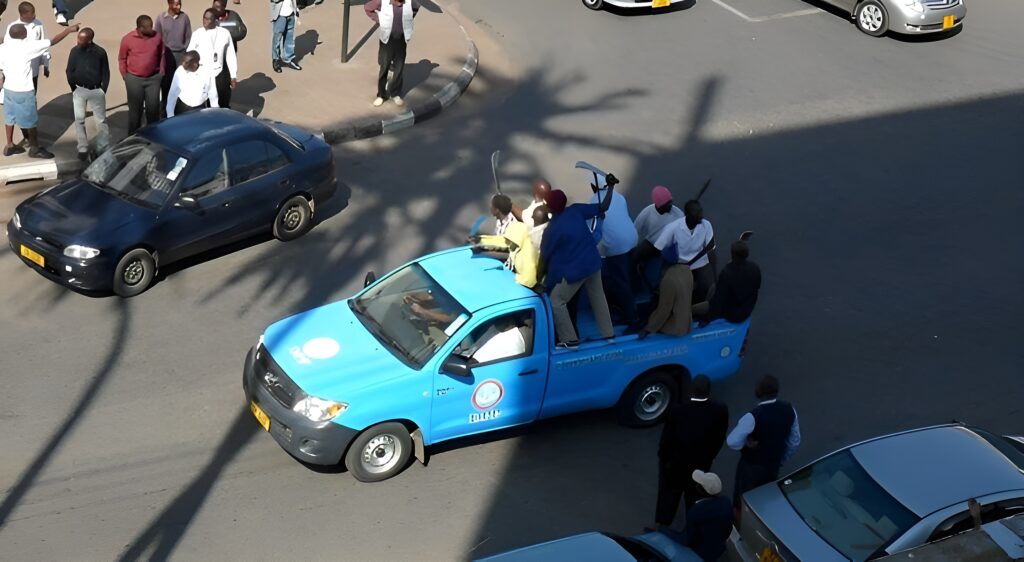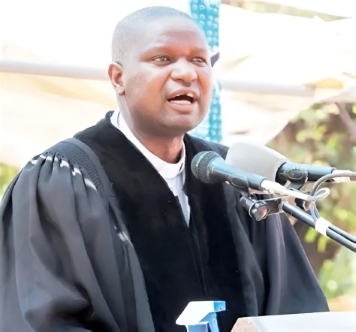The Church of Central Africa Presbyterian (CCAP) General Synod has delivered a damning verdict on violent politics aiming at bringing anarchy ahead of the September elections.
In a powerful and unapologetically hard-hitting Pastoral Letter read in all CCAP congregations across the country on Sunday, July 13th, 2025, the General Synod launched a scathing indictment of political violence, undemocratic party practices, and the manipulation of elections through imposition of candidates and intimidation.
Titled “You Are the Light of the World” and signed by eight reverends led by the Right Reverend Bizwick Nkhoma, the pastoral letter categorically urges CCAP members not to vote for political parties and leaders that are orchestrating violence and chaos in pursuit of power, an indirect but unmistakable rebuke of opposition players including the Democratic Progressive Party (DPP),


The DPP, through its Vice President Alfred Gangata have recently been notorious for sowing disorder and threats of insurrection and abuse of civil society platforms which the Pastoral Letter singled out as deeply unchristian and destructive.
“We strongly advise all CCAP members not to vote for leaders and political parties that are using violence to silence and suppress others. We urge all CCAP members to distance themselves from all political violence. We condemn every form of violence in our country,” reads the pastoral letter.
The church’s condemnation is a direct swipe at recent public threats by DPP-linked businessman and political provocateur Alfred Gangata, who has been leveraging questionable civil society fronts to incite unrest under the guise of public protests.
The letter warns that bogus NGOs and politically sponsored civil society actors are undermining peace ahead of the 2025 polls, a concern that has taken on new urgency as Malawi inches closer to what is expected to be a highly contested election.
Observers note that Gangata’s inflammatory statements and threats to unleash mass protests coupled with his role in funding political destabilization are clearly at odds with the Church’s urgent call for CCAP members to be “peacemakers” and “light in the nation.”
“We condemn every form of violence in our country,” the letter emphasizes. “Blessed are the peacemakers, because they will be called sons of God,” adds the Pastoral Letter referencing Matthew chapter 5 verse 9 of the Holy Bible.
In a bold departure from previous mild-toned messages, the 2025 CCAP Pastoral Letter also takes aim at the internal rot within political parties, condemning how party conventions and primary elections have been manipulated, rigged, and turned into platforms for treachery and deceit.
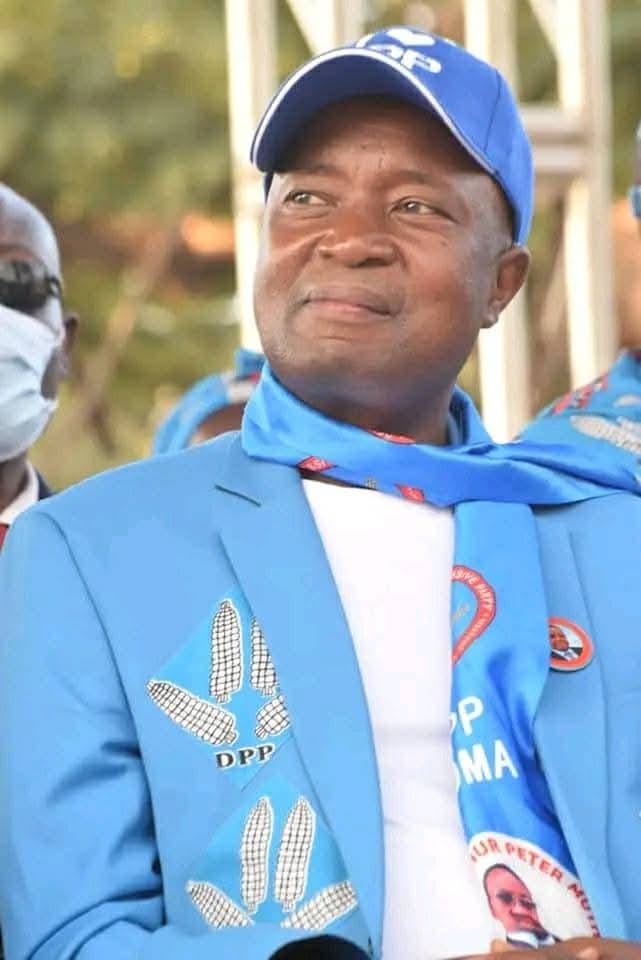
“It is sad to learn that some of the people who were/are involved in masterminding these foul ploys are Christians, and some are members of CCAP,” the letter notes. “Allow people to choose leaders of their choice.”
The CCAP’s message reflects strongly events such as the fraudulent UTM convention in Mzuzu in November 2024, where economist and now-DPP-aligned politician Dalitso Kabambe allegedly duped fellow aspirants.
What was supposed to be a fair and democratic process turned into a calculated political heist. Kabambe secured the UTM positions with a landslide victory amidst strong rumours that he was secretly paving the way for a return to the DPP, shocking and betraying grassroots supporters.
Equally damning is the church’s implicit reflection on candidate imposition. Recently the DPP has been in the news following the imposition of Jane Ansah in Ntcheu North East where the party unashamedly replaced the victor former Vice President Everton Chimulirenji without consulting local structures.
The fallout was immediate. Chimulirenji resigned from the party in protest, citing dictatorship and lack of transparency. The CCAP is unequivocal. Such behavior undermines democratic choice and betrays public trust.
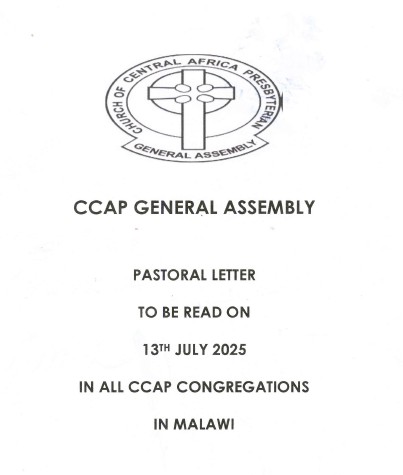
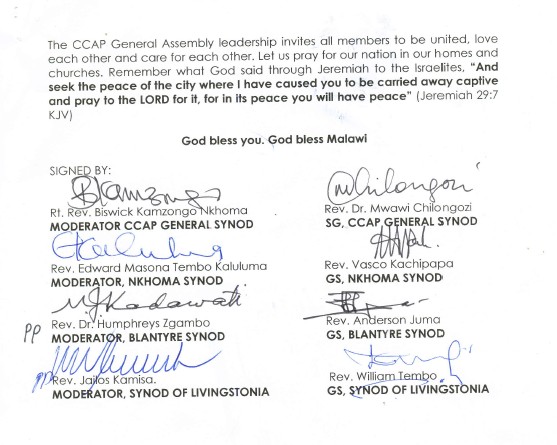
The CCAP clergy also says no to greedy alliances and unprincipled leaders.
The General Synod has not spared emerging opposition alliances in the rebuke. The letter advises political parties to form alliances based on principle and integrity, not tribalism, greed, or self-preservation.
“Malawians are not ready to be led by alliances formed by political parties whose leadership is greedy. We need leaders who have the heart for Malawians and not their tribe, region or religion,” the church warns.
Even if names are not mentioned, this call clearly reflects anxiety about the DPP’s monopolistic behavior in opposition alliance talks, where smaller parties have raised red flags about being used as “junior partners” without equal say.
At the heart of the CCAP’s message is a moral appeal to the conscience of its millions of members, many of whom belong to both ruling and opposition parties.
“Let us not vote based on tribe, region, or religious affiliation. We need to vote for the leadership whose vision will develop the nation to the benefit of all,” the Synod appeals.
The Church is clear, true Christians cannot and must not be complicit in installing leaders who threaten Malawi’s peace, unity, and democracy.
“We must not be desperate,” the church adds, warning its clergy not to sell the pulpit to political aspirants or use churches as fundraising platforms for party gain.
This Pastoral Letter marks a pivotal moment in the CCAP’s political engagement. With over a century of presence and being Malawi’s largest Protestant denomination, the General Synod has effectively thrown its weight into shaping the 2025 elections, not as a political player, but as a moral compass.
The letter is already sending shockwaves across the political spectrum, especially within the DPP and its orbit of political violence and elite arrogance. From Gangata’s threats, to Kabambe’s deceit, to the imposition of Jane Ansah, the message from the Church is loud and clear:
The era of rogue politics must end, and voters have the power to reject it.
